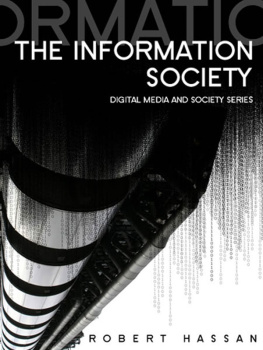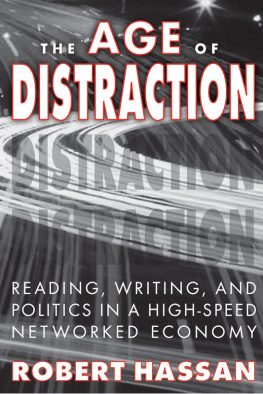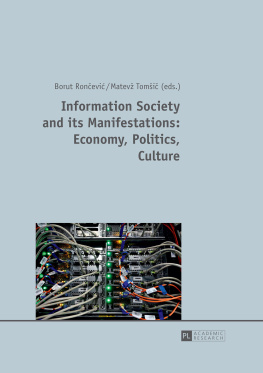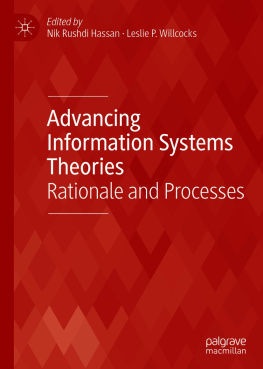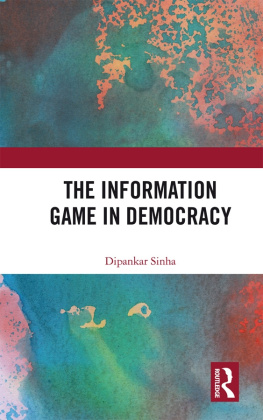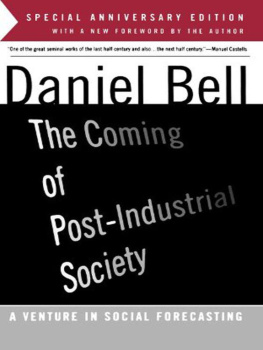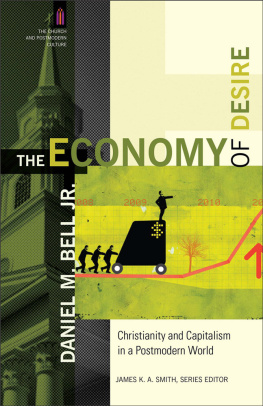The Information Society
Digital Media and Society Series
Mark Deuze, Media Work
Alexander Halavais, Search Engine Society
Robert Hassan, The Information Society
Tim Jordan, Hacking
Jill Walker Rettberg, Blogging
The Information Society
ROBERT HASSAN
polity
Copyright Robert Hassan 2008
The right of Robert Hassan to be identied as Author of this Work has been asserted in accordance with the UK Copyright, Designs and Patents Act 1988.
First published in 2008 by Polity Press
Polity Press
65 Bridge Street
Cambridge cb2 1ur, UK
Polity Press
350 Main Street
Malden, MA 02148, USA
All rights reserved. Except for the quotation of short passages for the purpose of criticism and review, no part of this publication may be reproduced, stored in a retrieval system, or transmitted, in any form or by any means, electronic, mechanical, photocopying, recording or otherwise, without the prior permission of the publisher.
ISBN-13: 978-0-7456-5528-4
A catalogue record for this book is available from the British Library.
Typeset in 10.25 on 13 pt FF Scala
by Servis Filmsetting Ltd, Stockport,
Cheshire Printed and bound in Great Britain by Biddles Ltd, Kings Lynn, Norfolk
The publisher has used its best endeavours to ensure that the URLs for external websites referred to in this book are correct and active at the time of going to press. However, the publisher has no responsibility for the websites and can make no guarantee that a site will remain live or that the content is or will remain appropriate.
Every effort has been made to trace all copyright holders, but if any have been inadvertently overlooked the publisher will be pleased to include any necessary credits in any subsequent reprint or edition.
For further information on Polity, visit our website: www.polity.co.uk
Preface
We live in an information society. This much is clear; indeed, this much is acutely palpable. It surrounds us and we are a part of it. We know this society insofar as it constitutes a growing reality that is reshaping the world and what it means to be an individual, a worker, and a member of the public within it. Information technologies based upon computer logic have networked our world, shrinking it to the point where it is possible to be constantly in touch with others, no matter where they are or what the time is. The extent of this connectivity is historically unprecedented and it is something that is growing in complexity and utility every minute of every day. How do we make sense of it?
Most of us are by now pretty comfortable with the Internet, for example. We use it to shop, to be entertained and to nd out information on the widest possible range of subjects. But why is it there? And what made it technologically (and politically) possible? Mobile phones, similarly, are a ubiquitous device used by seemingly everyone and are evident when walking on a city street, or travelling on public transport, from New Delhi to Sydney and from Montevideo to London. Mobile phones were rst developed in the 1940s, but what caused the technology to lie undeveloped and uncommercialized until the 1990s when they exploded as a social and cultural phenomenon, to the point where half of humanity now owns or has access to one?
The information society (and the networkable applications and gadgets that comprise it) is also now a central component of how we earn a living. From the orists shop on the street corner to the executive ofce on the top oor, being a part of the network society is becoming more and more a necessity instead of a ight of fancy. The orists will use it to nd the best prices from wholesalers and to advertise their wares; and the executives of the multinational will use digital connectivity for more or less the same reasons. We take all this for granted now, with barely a thought given to the process. Moreover, through practice and through trial and error we are becoming competent and often expert with these growing arrays of technical applications and gadgets, and through this learning process we simultaneously stitch ourselves deeper into the fabric of the information society. It becomes part of us and vice versa.
But what does it all mean? What has been gained, and has anything been lost? Is the world a more efcient, smarter and better-organized place? Perhaps most centrally, much of the rhetoric of the information society is oriented towards placing an emphasis upon the notion that information technologies empower the individual. As Bill Gates, founder of Microsoft, put it, computers are the most empowering tool weve ever created (Grossman, 2004). How true is this? Do you feel empowered by the acquisition of a new computer upgrade, or a faster processor, or a more multifunctional mobile phone?
These questions and more are becoming increasingly salient, and so this book is intended as an introductory guide to this new and radical society. We can begin by agreeing that it is impossible to look at the information society as some kind of punctual event as if it is something that simply happened in conjunction with sudden and unexpected advances in computer technology. The reality is, to employ a phrase by Fredric Jameson, that our technological present has a before and after time that only gradually reveal themselves (2001). It has a history (or histories) that are traceable through an interpretive framework of political economy that makes connections to the relevant social, political, economic and technological structures and institutions. The strands of history stretch back to the beginnings of the Industrial Revolution, and have, along their course, moments of great historical import with, for example, the development of the factory assembly line which rst produced the Model T car in the USA in 1914. This moment set in train a whole productive logic that swept the world. The post-Second World War context of Cold War rivalry between the USA and the USSR is another moment of profound importance in terms of the development of computer science. More recently, the great economic and social changes that came in the wake of the global economic crises of the mid-1970s set in train yet more strands of logic and paths of historical development that led to the construction of our networked and digital planet; an information society driven by a particularly virulent economic reorganization of industrial and social relations on a world scale.
For the purposes of understanding these interrelated dynamics, it seems to me that we can construct our framework of analysis through three interdependent processes that have inuenced and shaped our contemporary world in a most profound way. These will be dened and analysed in the main text, but let me preface them briey.
The rst is neoliberal globalization. This is the foremost economic dynamic that has, since the late 1970s, spread throughout the world to the point where, for the rst time in history, an economic system has no serious challengers (Klein, 2007). It is a logic that has become the basic grammar that informs our understanding of how the world operates (Anderson, 2007: 6). Second, and owing directly from neoliberal globalization, is the information technology revolution. In the 1960s and 1970s the economic imperatives of an emergent globalization began to dramatically supercharge basic research into computers that had, until that time, been largely within the purview of military research and university lab tinkering and brought it into the commercial realm. The third results from the eects of the rst two. Principally, this has been the speeding-up of time and the shrinking of space. Again, I shall explain these in more detail in the chapters, but it seems to me that much ows from this time space compression (Harvey, 1989: 241).
Next page
